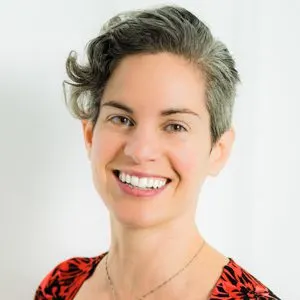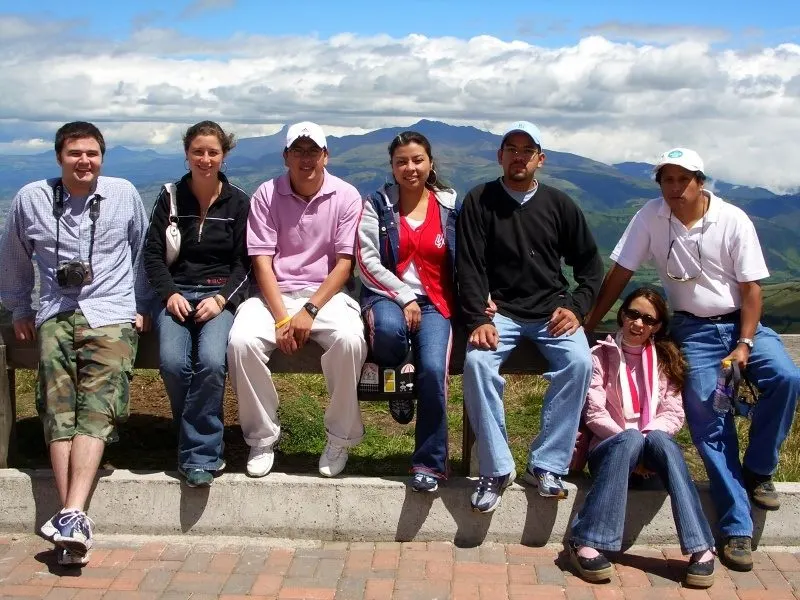TeachingTraveling.com: Fellow Boston teacher Emma, thanks so much for talking with us! Please tell us about your background.
Emma: I’m from Rhode Island, and I’ve been teaching science (Biology and Chemistry) in Boston for 4 years. After I graduated from college, I spent two years teaching English in Ecuador through WorldTeach.
TT: Awesome! Describe your time teaching in Ecuador.
E: I lived and taught English in Ecuador for two years. I lived with a host family for a year in Portoviejo, which is a really hot, dry, non-touristy city on the coast of Ecuador, and I taught community classes at a university there.
Then I lived in Quito for a year and taught in a similar setting. I went through a program called WorldTeach, so they set me up with the homestay and the job in Portoviejo.
After my year was up, I came home to RI as planned, but I wasn’t ready to be back! So after a few months of living with my parents, I went back to Ecuador and worked in Quito through contacts I had met through WorldTeach.
TT: How did you find this teaching traveling opportunity?
E: I found WorldTeach online after doing a pretty extensive search for long-term travel to Latin America. I was looking for something that would allow me to stay in one place and not be totally broke by the end of it. WorldTeach was exactly what I was looking for.
TT: How did you find the money to fund this travel?
E: As I was finishing my senior year of college, I decided I wanted to live in Latin America and REALLY learn Spanish. I actually became obsessed with this idea, and I felt I couldn’t rest until I did it.
So, I lived at home for the 9 months after I graduated and waitressed at a pub. I had to pay a fee to WorldTeach for placement and training, plus I needed money for travel costs, but overall I didn’t end up losing that much money because I got paid a salary while I was working in Ecuador.
TT: Tell us one moment from your travels that was particularly funny or powerful.
E: I think the funniest moment of the two years (and believe me, there were many bizarre cultural misunderstandings) was during the time that my parents and sister came to visit me. I brought my family to one of my classes to meet my students. At the end of the class, one of my students announced that they had canceled the next day’s class and that we would instead be going to a party at Jimmy’s house in honor of my family.
Seeing my very white, American dad be forced to dance Reggaeton with my students at 10 in the morning while drinking beer and eating raw fish was one of the most unusual moments of my life.
TT: That’s a phenomenal image. So how have your travels impacted you as a teacher?
E: Living abroad has definitely given me an appreciation for ways in which culture influences a person’s approach to learning. For example, cheating on tests was the norm in Portoviejo. It wasn’t seen as a bad thing; it was just what you did to help out your classmates. Ecuadorian culture is much more communally oriented than U.S. culture, and giving another student the answer was the nice, polite thing to do.
Back in the classroom at home in Boston, I try to keep cultural differences in mind in the classroom, where so many different ethnic and family cultures all come together and influence students’ attitudes and behaviors around learning and interacting with peers. Also, I can speak Spanish, which is a definite perk with my students and their families.
TT: Indeed! Now, how have your travels impacted you as a person?
E: Ahhh… big question. At risk of sounding cliche, they were life-changing, perspective-widening, eye-opening, all those things that travel brochures and study abroad catalogs claim.
I lived in another family’s home FOR A YEAR, went weeks without speaking to another native English speaker, learned a new language, navigated a new culture, and learned how to be a teacher all in two years. I learned an immense amount about myself.
I also saw and experienced things I will never see in the United States. I went to an indigenous village at about 12,000 feet above the Equator and was served boiled guinea pig. I saw 6 year old street children swallowing fire at 10 pm on the street corners in Quito.
Living in another country really gave me a new perspective on my own country and its enormous strengths and weaknesses, as well as on the world in general and on myself and how make my way in it.
TT: Well-said! What advice do you have for other teachers who are dreaming of travel?
E: Go! Don’t wait. If you have the itch, go. You will not regret it. Even if it is all terrible, at least you can look back and say you went. And you will have learned more than by staying here. Go!!
TT: Thanks so much for your words of wisdom and motivating experience, Emma! Yay for Boston teachers who travel!

The author, Lillie Marshall, is a 6-foot-tall National Board Certified Teacher of English from Boston who has been a public school educator since 2003. She launched TeachingTraveling.com in 2010 to share expert global education resources, and over 1.6 million readers have visited over the past decade. Lillie also runs AroundTheWorld L.com Travel and Life Blog, and DrawingsOf.com for educational art. Do stay in touch via subscribing to her monthly newsletter, and following @WorldLillie on social media!





DENNY JAMES
Saturday 24th of October 2015
Dear
I am Denny James an Indian. By profession, I am an English Teacher and certified TESOL Teacher. I would like to move to Ecuador and teach English. What about the opportunities for teaching English by non- native speakers of English? what is the salary? Are there any international schools? I have also experience in teaching IGCSE Syllabus by University of Cambridge.
David Compton
Friday 26th of October 2012
I am interested in teaching in Ecuador. I am a senior citizen; however, I do have two graduate degrees in English and education. Moreover, I am credentialed in secondary education in English and social studies in the State of California. Finally, I am somewhat proficient in Spanish (speaking, reading and writing), and I love the culture.
Unfortuately, I do not have any friends in Ecuador, and I am not quite sure how one would apply for positions in education. I would assume that I could also teach at the post secondary level since I am in possession of two graduate degrees.
Indeed, I would appreciate any feedback concerning this issue. I must confess that I don't quite know how to get started!
Thanks, David
Lillie of TeachingTraveling.com
Friday 26th of October 2012
Great questions! There are lots of different ways that you could get into it. Keep browsing this site and the web and you'll get some good possibilities. Keep us posted, and good luck!
Jeremy Branham
Wednesday 13th of June 2012
Very interesting perspective on teaching Ecuador. I love that unusual moment with her dad. I can laugh at that because it wasn't my family ! :)
I think any time people travel and attempt to immerse themselves in the culture, it changes their perspective on their own lives and country. After spending a year doing it, I can only imagine how different you would be when you came home.
Lillie of TeachingTraveling.com
Wednesday 13th of June 2012
I heartily agree!
Kate
Monday 16th of January 2012
Hi Emma!
I just found this archived post from 2010... but I would love to hear more about your experience. I recently discovered the World Teach program in Ecuador and I am considering applying for September! If you would be willing to chat more with me, that would be great! Here is my email: [email protected]. Thanks!
Kate
Lillie of TeachingTraveling.com
Monday 16th of January 2012
From 2010 or not, this post is still fresh! I'll contact Emma and make sure she sees this to respond. Thanks so much for making contact, and good luck!
Hannah
Wednesday 3rd of November 2010
Thanks for the hilarious reminder! Watching dad try do dance Reggaeton with your students was probably the funniest moment of my life! Especially when the girls started to dance with him!